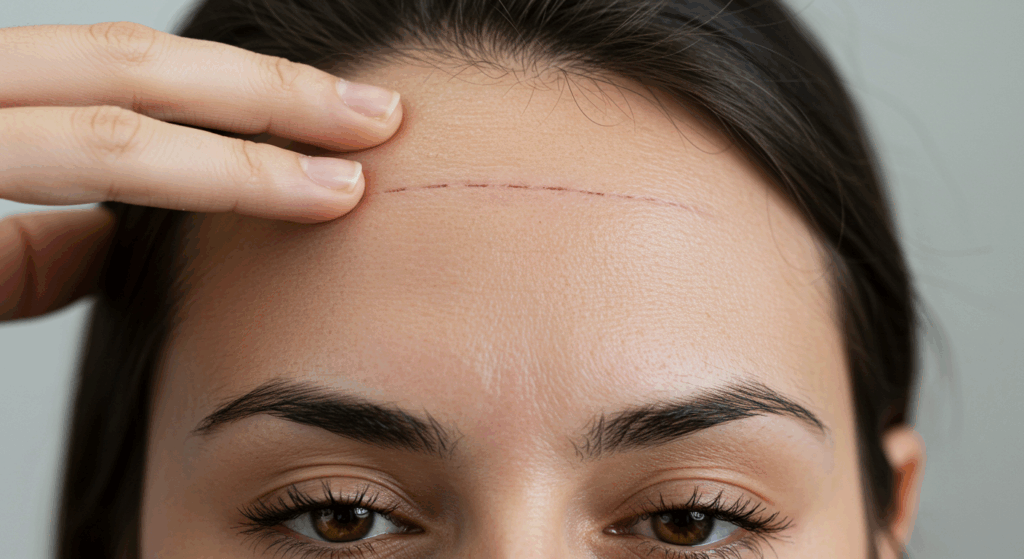Someterse a una coronal incisión procedimiento is a significant step, whether for medical or cosmetic reasons. Proper pre-operative preparación is crucial for ensuring a smooth cirugía and optimal recuperación. This guía provides a comprehensive, step-by-step breakdown of everything you need to know before your procedure, from medical evaluations to lifestyle adjustments.
By following these guidelines, you’ll minimize riesgos, enhance recovery, and achieve the best possible outcome. Let’s dive into the essential preparations you need to make.

Tabla de contenido
1. Evaluaciones y consultas médicas
1.1. Evaluación médica prequirúrgica
Before your procedimiento de incisión coronal, your surgeon will conduct a thorough medical assessment to ensure you’re a suitable candidate. This typically includes:
- Análisis de sangre: Para detectar infecciones, anemia o trastornos de la coagulación.
- Electrocardiograma (ECG): Para evaluar la salud del corazón, especialmente en pacientes mayores de 40 años o con antecedentes de enfermedad cardíaca.
- Pecho X-Ray: Para evaluar la salud pulmonar y descartar problemas respiratorios.
- Pruebas de alergia: To identify potential allergic reactions to anestesia or medications.
1.2. Consulta con su cirujano
Durante su consulta, su cirujano:
- Hable sobre su historial médico, incluidas cirugías pasadas, enfermedades crónicas y medicamentos.
- Explique el procedimiento en detalle, incluidos los riesgos, beneficios y resultados esperados.
- Proporcionar instrucciones preoperatorias adaptadas a sus necesidades específicas.
For more insights on preparing for cirugía, check out our guide on Cómo prepararse para la cirugía plástica.
2. Ajustes del estilo de vida antes de la cirugía
2.1. Dieta y nutrición
Your diet plays a critical role in preparing your cuerpo for surgery. Focus on:
- Hidratación: Bebe al menos 8 vasos de agua al día para mantenerte hidratado.
- Alimentación equilibrada: Consume a diet rich in proteins, vitamins, and minerals to support cicatrización. Include lean meats, fruits, vegetables, and whole grains.
- Evite el alcohol y la cafeína: Ambos pueden deshidratarte e interferir con la anestesia.
2.2. Fumar y la nicotina
Smoking and nicotine use can impair healing and increase the risk of complicaciones. It’s essential to:
- Deje de fumar al menos 4 semanas antes de la cirugía.
- Evite los parches de nicotina, la goma de mascar o los productos de vapeo.
2.3. Ejercicio y actividad física
Si bien es importante mantenerse activo, evite el ejercicio intenso la semana previa a la cirugía. Concéntrese en actividades ligeras, como caminar, para mantener la circulación.
3. Gestión de medicamentos
3.1. Medicamentos que se deben evitar
Ciertos medicamentos pueden aumentar el sangrado o interferir con la anestesia. Su cirujano podría recomendarle evitar:
| Tipo de medicamento | Ejemplos | Cuándo parar |
|---|---|---|
| Anticoagulantes | Aspirina, warfarina, ibuprofeno | 2 semanas antes de la cirugía |
| Suplementos herbales | Ginkgo Biloba, Ajo, Ginseng | 2 semanas antes de la cirugía |
| Vitamina E | Suplementos de dosis alta | 2 semanas antes de la cirugía |
3.2. Medicamentos aprobados
Your surgeon may prescribe or approve certain medications to manage dolor or prevent infections post-surgery. Always follow their instructions regarding:
- Antibióticos para prevenir la infección.
- Analgésicos para el confort postoperatorio.
4. Logística y planificación
4.1. Organizar el transporte
You won’t be able to drive immediately after surgery. Arrange for a friend or family member to drive you hogar post-procedure.
4.2. Prepare su espacio de recuperación
Prepare un área de recuperación cómoda en casa con:
- Almohadas para mantener la cabeza elevada.
- Ice packs to reduce hinchazón.
- Comidas y snacks fáciles de preparar.
- Entretenimiento como libros, películas o música.
4.3. Plan de cuidados postoperatorios
Asegúrese de contar con alguien que le asista durante las primeras 24 a 48 horas después de la cirugía. Puede ayudarle con:
- Administración de medicamentos.
- Preparando comidas.
- Ayuda con la movilidad.
Para obtener más consejos sobre la recuperación, lea nuestro artículo sobre Consejos para una recuperación sin problemas después de la cirugía.
5. Preparación mental y emocional
Someterse a una cirugía puede ser un desafío emocional. Aquí te explicamos cómo prepararte mentalmente:
- Edúquese usted mismo: Aprenda sobre el procedimiento, el proceso de recuperación y los resultados esperados para reducir la ansiedad.
- Establezca expectativas realistas: Understand that recovery takes time and resultados may not be immediate.
- Practice Relaxation Techniques: La meditación, la respiración profunda o el yoga pueden ayudar a controlar el estrés.
6. Comprensión de los riesgos y las complicaciones
Todo procedimiento quirúrgico conlleva riesgos. En el caso de una incisión coronal, las posibles complicaciones incluyen:
- Infección en el sitio de la incisión.
- Sangrado o hematoma.
- Daño a los nervios que produce entumecimiento o debilidad.
- Scarring or cabello loss along the incision line.
Para obtener más información sobre los riesgos, visite nuestro artículo sobre Levantamiento de cejas endoscópico vs. coronal: ventajas y desventajas.
7. Lista de verificación preoperatoria
Utilice esta lista de verificación para asegurarse de estar completamente preparado para el procedimiento de incisión coronal:
| Tarea | Terminado |
|---|---|
| Completar todas las pruebas médicas preoperatorias | |
| Consulte con su cirujano y aborde todas las preguntas. | |
| Ajuste la dieta y evite el alcohol, la cafeína y el tabaco. | |
| Deje de tomar anticoagulantes y suplementos a base de hierbas. | |
| Organizar el transporte y la atención postoperatoria. | |
| Prepara tu espacio de recuperación en casa | |
| Practique técnicas de relajación para controlar el estrés. |

Conclusión: Su camino hacia un procedimiento exitoso
Principales conclusiones
- Una preparación preoperatoria adecuada es esencial para minimizar los riesgos y garantizar una recuperación sin problemas.
- Siga las instrucciones de su cirujano con respecto a las evaluaciones médicas, los ajustes en el estilo de vida y el manejo de los medicamentos.
- Planifique los cuidados posoperatorios y prepare su espacio de recuperación con antelación.
- Comprenda los posibles riesgos y complicaciones asociados con el procedimiento de incisión coronal.
Próximos pasos
Ahora que está equipado con esta guía completa, siga los siguientes pasos:
- Programe sus evaluaciones médicas preoperatorias.
- Consulte con su cirujano para resolver cualquier duda restante.
- Comience a realizar ajustes en su estilo de vida para preparar su cuerpo para la cirugía.
- Organizar la logística como el transporte y la atención postoperatoria.
Preguntas frecuentes (FAQ)
1. ¿Cuánto tiempo lleva recuperarse de un procedimiento de incisión coronal?
El tiempo de recuperación varía, pero la mayoría de los pacientes pueden retomar sus actividades normales en un plazo de 2 a 4 semanas. La recuperación completa puede tardar varios meses.
2. ¿Tendré cicatrices visibles después del procedimiento?
The coronal incision is typically made along the línea de pelo, which helps conceal scars. However, some scarring may be visible initially but usually fades over time.
3. ¿Puedo lavarme el cabello después de la cirugía?
Deberá evitar lavarse el cabello durante al menos 48 horas después de la cirugía. Su cirujano le dará instrucciones específicas sobre cuándo es seguro volver a lavarse el cabello.
4. ¿Qué debo vestir el día de la cirugía?
Use ropa holgada y cómoda que no sea necesario pasar por encima de la cabeza. Evite las joyas, el maquillaje y los lentes de contacto.
5. ¿Cómo puedo controlar el dolor después del procedimiento?
Su cirujano le recetará analgésicos para aliviar las molestias. Aplicar compresas de hielo en la zona de la incisión también puede ayudar a reducir la inflamación y el dolor.
6. ¿Existen restricciones dietéticas después de la cirugía?
Durante los primeros días, consuma alimentos blandos y fáciles de digerir. Evite los alimentos picantes, crujientes o difíciles de masticar que puedan causar tensión en la zona de la incisión.
7. ¿Cuándo puedo volver a trabajar?
La mayoría de los pacientes pueden reincorporarse al trabajo en un plazo de 2 a 3 semanas, dependiendo de su trabajo. Evite actividades extenuantes durante al menos 4 a 6 semanas.
8. ¿Cuáles son los signos de infección después de la cirugía?
Esté atento a síntomas como aumento del dolor, enrojecimiento, hinchazón o secreción en la incisión. La fiebre o los escalofríos también pueden indicar una infección. Contacte a su cirujano de inmediato si nota alguno de estos signos.
Visita Perfil de Instagram del Dr. MFO ¡para ver transformaciones reales de pacientes! Eche un vistazo a los increíbles resultados obtenidos mediante el tratamiento facial. cirugía de feminización y otros procedimientos. El perfil muestra el antes y el después. fotos que resaltan Dr. OFMLa experiencia y la visión artística de en la creación de resultados hermosos y de apariencia natural.
¿Listo para dar el siguiente paso en su viaje? Planificar una consulta gratis con Dr. OFM ( El mejor cirujano de feminización facial para ti) hoy. Durante la consulta, puedes hablar sobre tus objetivos, hacer cualquier pregunta que tengas y aprender más sobre cómo Dr. OFM puede ayudarle a lograr el aspecto deseado. No dude en aprovechar esta oportunidad gratuita para explorar sus opciones y ver si Dr. OFM es el adecuado para usted.








